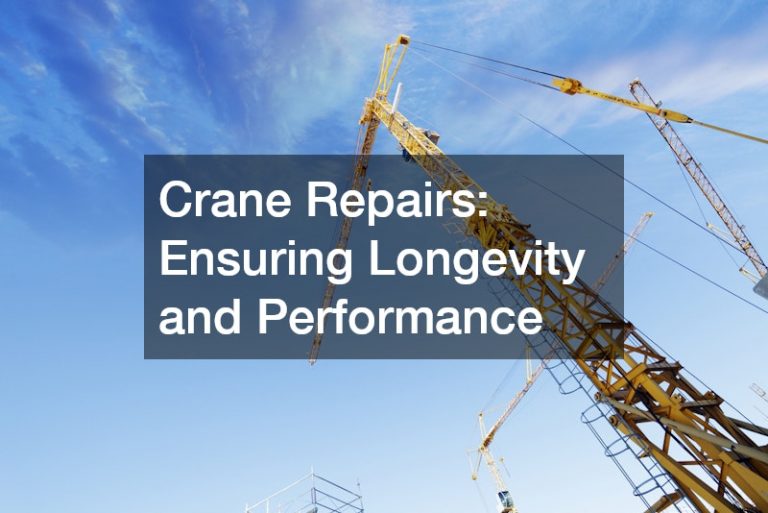Cranes play a vital role in construction, manufacturing, shipping, and industrial operations. These powerful machines lift and move massive loads that would otherwise be impossible to handle manually. Because of their demanding workload, cranes require ongoing maintenance and timely repairs to function safely and efficiently. Regular crane repairs not only extend the equipment’s lifespan but also ensure that operations remain smooth, cost-effective, and compliant with safety standards.
The Importance of Regular Crane Maintenance
Cranes are subjected to significant stress during daily use, and even minor wear can lead to major problems if left unaddressed. Regular maintenance helps identify potential issues before they escalate into costly failures or safety hazards.
Routine inspections, lubrication, and part replacements ensure that every component—from cables and pulleys to hydraulics and electrical systems—operates at peak performance.
Beyond reliability, consistent maintenance also helps businesses comply with regulatory standards established by organizations like OSHA (Occupational Safety and Health Administration). Failing to maintain a crane properly can lead to operational downtime, fines, or even workplace accidents. By scheduling regular inspections and addressing any needed crane repairs promptly, companies can minimize risks and avoid disruptions that impact productivity.
Common Issues That Require Crane Repairs
Cranes are complex machines with numerous mechanical and electrical systems working in harmony. Over time, various issues can arise that demand professional attention. Some of the most common include:
-
Hydraulic System Leaks: Hydraulic cranes rely on fluid pressure to lift and move loads. Leaks can reduce efficiency, cause overheating, or lead to dangerous malfunctions if ignored.
-
Wire Rope Wear: The wire rope is critical for lifting, but it’s prone to fraying or corrosion over time. Routine inspection ensures that damaged ropes are replaced before they fail under load.
-
Electrical Failures: Faulty wiring, malfunctioning sensors, or control system issues can lead to unpredictable crane behavior, making timely electrical repairs essential.
-
Mechanical Fatigue: Continuous operation can wear down gears, bearings, and joints, requiring careful monitoring and replacement to prevent breakdowns.
-
Alignment Problems: Misalignment in the crane’s structure or components can lead to uneven wear and reduced operational precision.
By addressing these problems through professional crane repairs, operators can maintain consistent performance and reduce the likelihood of costly accidents or downtime.
The Role of Skilled Technicians in Crane Repairs
Crane repair and maintenance demand a high level of technical expertise. Experienced technicians understand the intricacies of different crane types—whether mobile, overhead, tower, or gantry cranes—and are trained to identify and correct problems efficiently. Their knowledge of mechanical systems, hydraulics, and electrical controls ensures that repairs are performed accurately and safely.
Skilled professionals also rely on advanced diagnostic tools to assess equipment condition and performance. Vibration analysis, load testing, and thermal imaging allow technicians to pinpoint potential failures before they occur. This proactive approach keeps cranes operating within safe parameters and helps businesses plan maintenance around production schedules rather than emergency breakdowns.
Benefits of Timely Crane Repairs
Timely crane repairs do more than just fix immediate issues—they protect your investment and ensure long-term operational efficiency. When maintenance is delayed, small issues such as minor leaks or alignment errors can evolve into significant mechanical failures. This can lead to expensive repairs, unplanned downtime, and even safety incidents.
Prompt repairs help prevent these risks and extend the lifespan of the equipment. A well-maintained crane operates more smoothly, consumes less energy, and requires fewer emergency interventions. It also provides peace of mind knowing that the machine can handle demanding loads safely and reliably.
Another key benefit is cost control. Regularly scheduled repairs and preventive maintenance are typically far less expensive than major overhauls or replacements. Businesses that prioritize consistent care for their cranes often save significantly on long-term operational expenses.
Ensuring Compliance and Safety
Safety is non-negotiable in any industry that relies on cranes. Improperly maintained equipment poses serious risks to operators, other workers, and nearby property. Many safety regulations require documented inspections and repair histories to verify that cranes meet operational standards.
Professional crane repair services help companies stay compliant by performing thorough inspections, recording maintenance activities, and ensuring that all repairs meet industry requirements. Technicians also provide recommendations for ongoing care, operator training, and load testing—further promoting a culture of safety and responsibility in the workplace.
Extending Equipment Lifespan Through Preventive Care
The best way to ensure long-term crane performance is through preventive maintenance programs. These programs involve scheduled inspections, component lubrication, and periodic part replacements designed to reduce the likelihood of unexpected failures. Preventive care not only keeps the crane running efficiently but also maintains its value over time.
By partnering with trusted service providers who specialize in crane repairs and maintenance, companies can avoid the uncertainty and expense of unplanned equipment downtime. This proactive investment yields long-term savings and contributes to overall project efficiency.
Cranes are indispensable assets in industries that rely on heavy lifting and precision handling. To keep these powerful machines performing safely and efficiently, regular maintenance and expert crane repairs are essential. Skilled technicians, modern diagnostic tools, and proactive service schedules ensure that cranes operate at peak performance, minimize downtime, and maintain compliance with safety regulations. By investing in timely repairs and ongoing maintenance, businesses not only protect their equipment but also ensure the safety, longevity, and reliability that keep their operations moving forward.





